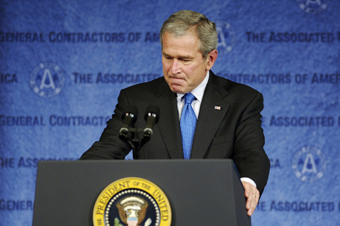America
Bush's veto survives challenge
(AP)
Updated: 2007-05-03 09:58
 |
Large Medium Small |
US Congress failed to override President Bush's veto of legislation requiring the withdrawal of US troops from Iraq on Wednesday, a defeat for anti-war Democrats that triggered immediate talks on a new measure to fund the conflict.
 U.S. President George W. Bush pauses during remarks about the Iraq war to the Associated General Contractors of America at a conference in Washington May 2, 2007.[Reuters]  |
"I'm confident we can reach agreement," the president said moments after the vote as he sat down at the White House with leaders of the Democratic-controlled Congress, who have vowed repeatedly to force him to change his war policy.
| ||||||
There was early talk in both parties of setting goals for the government of Iraq to meet as it strives to develop a self-defending, democratic society, but no agreement on what form they should take, or on how — or whether — to enforce them.
"Make no mistake, Democrats are committed to ending this war," House Speaker Nancy Pelosi (news, bio, voting record), D-Calif, said on a day of carefully scripted political drama at both ends of Pennsylvania Avenue. "We hope to do so in unison with the president of the United States."
At the same time, Republicans who have helped Bush sustain his policy quickly signaled a new impatience with a war that has claimed the lives of more than 3,300 U.S. troops.
"Obviously the president would prefer a straight funding bill, no benchmarks, no conditions, no reports. Many of us on both sides of the aisle don't agree with that," said Sen. Susan Collins (news, bio, voting record), R-Maine. She expressed interest in a proposal to cut reconstruction aid to Iraq if the Baghdad government does not live up to its promises.
Collins' sentiment was echoed by several House Republicans, who said that while they had cast their votes to sustain the veto, they wanted to signal impatience with a war that is unpopular with the public, and also with the administration's policy. They spoke on condition of anonymity, saying they were not yet ready to differ publicly with the White House.
The veto vote hewed closely to party lines, with 220 Democrats and two Republicans in favor of overriding the president, and 196 Republicans and seven Democrats voting to sustain him.
Despite the magnitude of the issue, Bush's political victory was a foregone conclusion, and the one-hour debate on the House floor lacked suspense.
While Pelosi and other Democrats took turns criticizing Bush, Rep. John Boehner (news, bio, voting record) of Ohio, the Republican leader, said that terrorists had made Iraq the central focus of their war against the United States.
"If we're not going to stand up to them in Iraq, we're not going to take them on in Iraq and defeat them there, where and when will we do it?" he asked.
The day's developments unfolded as the fourth of five brigades ordered into the war zone in January poured into Baghdad. Bush decided on the increased deployment as part of an attempt to quell sectarian violence.
It was only the second time in 6 1/2 years he has rejected a bill sent to him. In his formal veto message, he wrote that "the micromanagement in this legislation is unacceptable."
He also called the original bill unconstitutional for directing war operations "in a way that infringes upon the powers vested in the presidency."
Outside the White House, Senate Majority Leader Harry Reid (news, bio, voting record) bristled at that claim. "We are not going to be submitting our legislation to somebody at one of the law schools to look for its constitutionality. We have an obligation, under the terms of the Constitution, to legislate," he said. "That's our job."
The main sticking point concerned the Democratic demand for a troop withdrawal timeline. Under the vetoed measure, the withdrawal would have begun no later than Oct. 1, with a goal of completion six months later.
It seemed unlikely Democrats would try the same approach a second time.
Instead, there was talk of establishing standards for the Iraq government to meet, such as enacting legislation to share oil resources, holding provincial elections and spending $10 billion of its own money on reconstruction.
"Benchmarks are important, but they have to have teeth in order to be effective," Pelosi said.
Whatever the ultimate outcome, Democrats said they were eager to proceed quickly.
"We're not going to leave our troops in harm's way ... without the resources they need," said House Majority Leader Steny Hoyer (news, bio, voting record) of Maryland. He said he hopes to have a replacement measure ready for a vote within two weeks.
Bush has said the funds are needed quickly to prevent serious disruptions in military activities. Officials said White House Chief of Staff Josh Bolten would meet with Reid and Senate Republican leader Mitch McConnell (news, bio, voting record) of Kentucky on Thursday.
The House vote and subsequent White House meeting occurred in a political environment of increasing complexity.
While the Democratic leadership in Congress signaled it was ready to make concessions, at least one of the party's presidential hopefuls called for a more confrontational approach.
"We've got a few days — maybe less — to do absolutely everything we can to ensure this Congress responds to Bush's veto by sending another binding plan to end the war," former Sen. John Edwards wrote in a fundraising appeal on his Web site.
Assuming they jettison the withdrawal timetable, Democrats could face significant defections on the next legislation. That, in turn, would give Republicans in the House and Senate more leverage.
| 分享按钮 |

